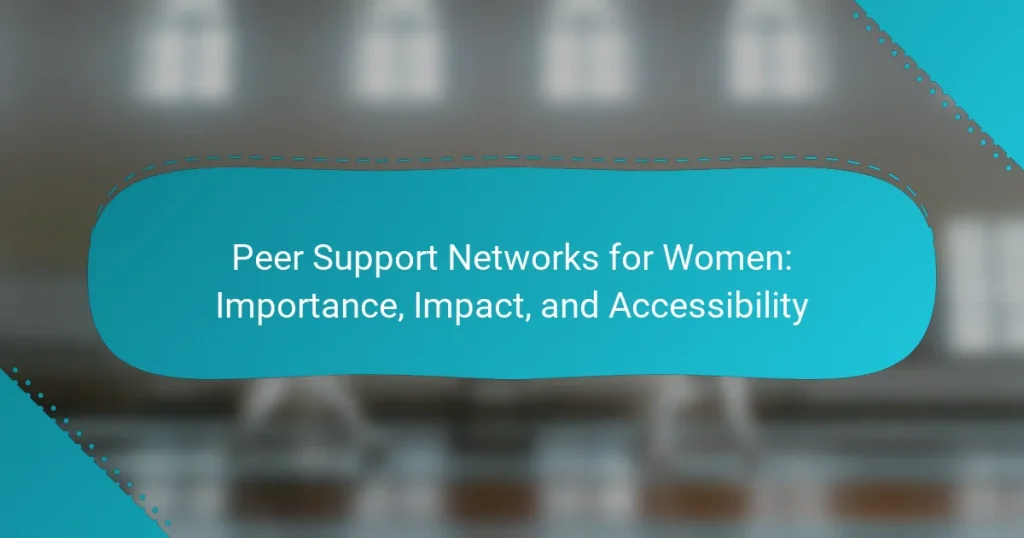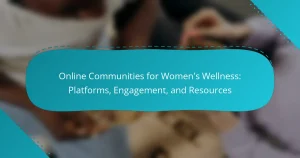Peer support networks for women provide vital emotional and practical support, fostering empowerment and resilience. These networks enhance mental well-being through shared experiences and community connections. Accessibility varies, with many utilising online platforms to reach broader audiences. Successful networks prioritise inclusivity, confidentiality, and innovative outreach to address diverse needs effectively.
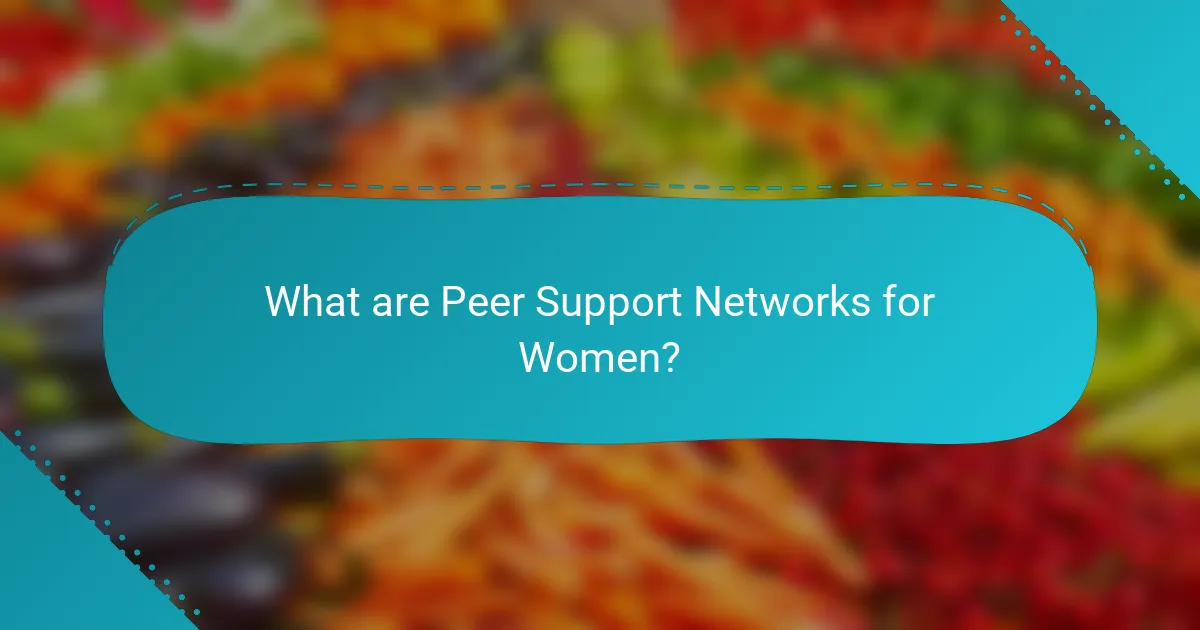
What are Peer Support Networks for Women?
Peer support networks for women are collaborative groups that provide emotional and practical support. These networks foster empowerment, enhance mental well-being, and promote shared experiences among women. They are crucial for building resilience and community connections. Accessibility varies, with many networks offering online platforms to reach wider audiences.
How do Peer Support Networks function?
Peer support networks function by connecting individuals who share similar experiences and challenges. These networks provide emotional support, practical advice, and a sense of community. They empower women by fostering resilience and promoting mental well-being. Accessibility is crucial; online platforms and local groups enhance participation. Unique attributes include tailored resources for specific issues, such as postpartum depression or workplace challenges. As a result, these networks significantly impact women’s lives, offering a supportive environment for personal growth and healing.
What roles do facilitators play in these networks?
Facilitators in peer support networks for women play crucial roles in enhancing engagement and fostering connection. They guide discussions, ensure a safe environment, and promote inclusivity among participants. Facilitators also help identify individual needs, allowing for tailored support. Their presence encourages sharing experiences, which can lead to personal growth and empowerment. Additionally, they may organise activities and resources, increasing the network’s overall accessibility and effectiveness.
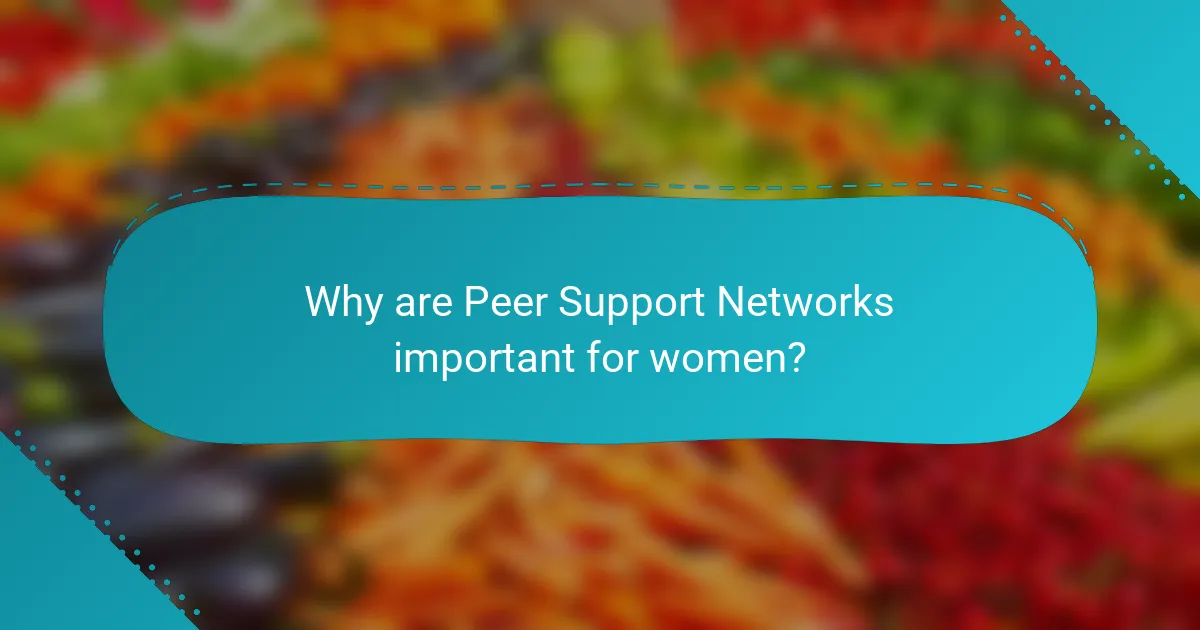
Why are Peer Support Networks important for women?
Peer support networks are vital for women as they foster community, promote mental health, and enhance personal growth. These networks provide a safe space for sharing experiences and challenges, which can lead to increased confidence and resilience. Research shows that women involved in peer support experience lower levels of anxiety and depression. Additionally, they gain access to resources and opportunities that may not be available otherwise, making these networks crucial for empowerment and accessibility.
What emotional benefits do women gain from these networks?
Women gain emotional benefits from peer support networks, including increased self-esteem, reduced feelings of isolation, and enhanced resilience. These networks foster a sense of belonging and provide emotional validation. Research indicates that women who engage in such networks report improved mental health outcomes and greater life satisfaction. Additionally, the shared experiences within these groups create strong interpersonal connections, which can lead to lasting friendships and increased emotional support.
How do these networks enhance mental health?
Peer support networks enhance mental health by providing emotional support and fostering connections. These networks create safe spaces for women to share experiences, reducing feelings of isolation. Research shows that participants often report increased self-esteem and resilience. Furthermore, access to shared resources and coping strategies empowers women to manage mental health challenges effectively.
What social connections are fostered through these networks?
Peer support networks for women foster connections that enhance emotional well-being and social resilience. These networks provide a platform for sharing experiences, offering advice, and building friendships. Members often gain a sense of belonging and empowerment, which can lead to improved mental health outcomes. Additionally, these networks can facilitate professional connections, mentorship opportunities, and resource sharing, thus expanding members’ social and professional circles.
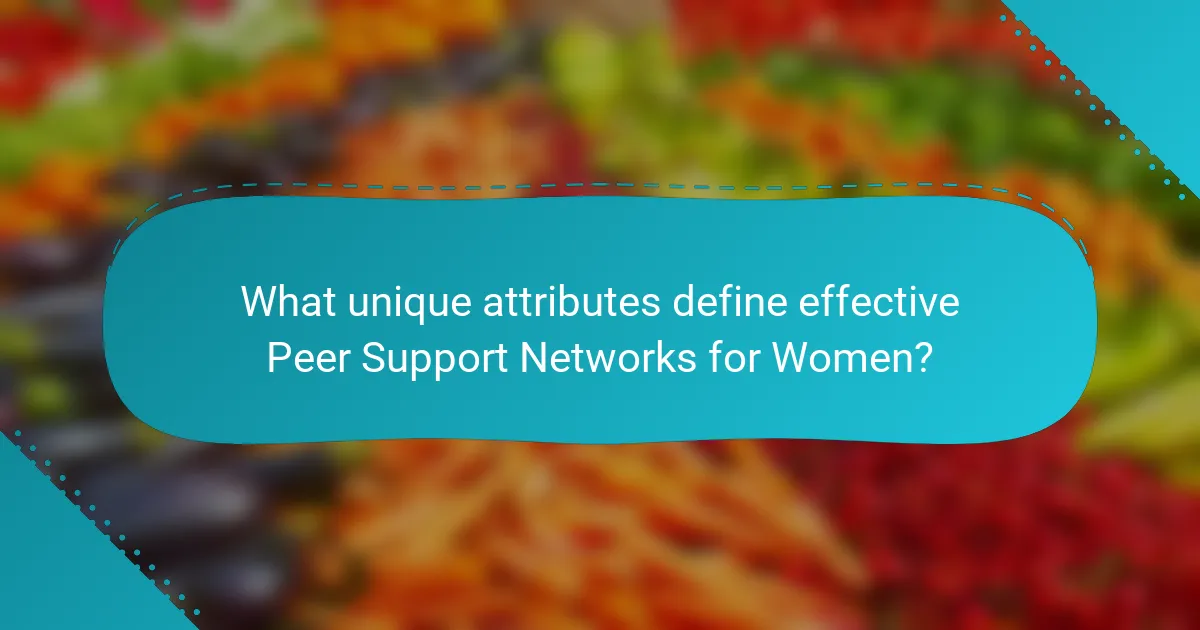
What unique attributes define effective Peer Support Networks for Women?
Effective Peer Support Networks for Women are defined by their inclusivity, shared experiences, and empowerment focus. These networks foster a sense of belonging and provide emotional support, which is crucial for mental well-being. Unique attributes include a strong emphasis on confidentiality and trust, enabling open communication among members. Additionally, accessibility through online platforms enhances participation, particularly for those in remote areas.
How do cultural factors influence the effectiveness of these networks?
Cultural factors significantly influence the effectiveness of peer support networks for women. These networks thrive in environments that value community, shared experiences, and open communication. For instance, cultures that prioritise collectivism often see stronger participation and support.
Additionally, language barriers and differing cultural norms can affect accessibility and engagement. Women from diverse backgrounds may face unique challenges, impacting their ability to connect with these networks. As a result, tailoring support strategies to accommodate cultural variations enhances the overall impact of peer support initiatives.
Understanding these dynamics fosters inclusivity, ensuring that networks effectively address the needs of all women.
What types of activities are most beneficial within these networks?
Peer support networks for women benefit from various activities that foster connection and empowerment. Key activities include group discussions, skill-sharing workshops, mentorship programmes, and wellness sessions. These activities enhance emotional support, build resilience, and promote personal growth among participants. Engaging in shared experiences strengthens bonds and encourages collaboration, creating a safe space for women to thrive.
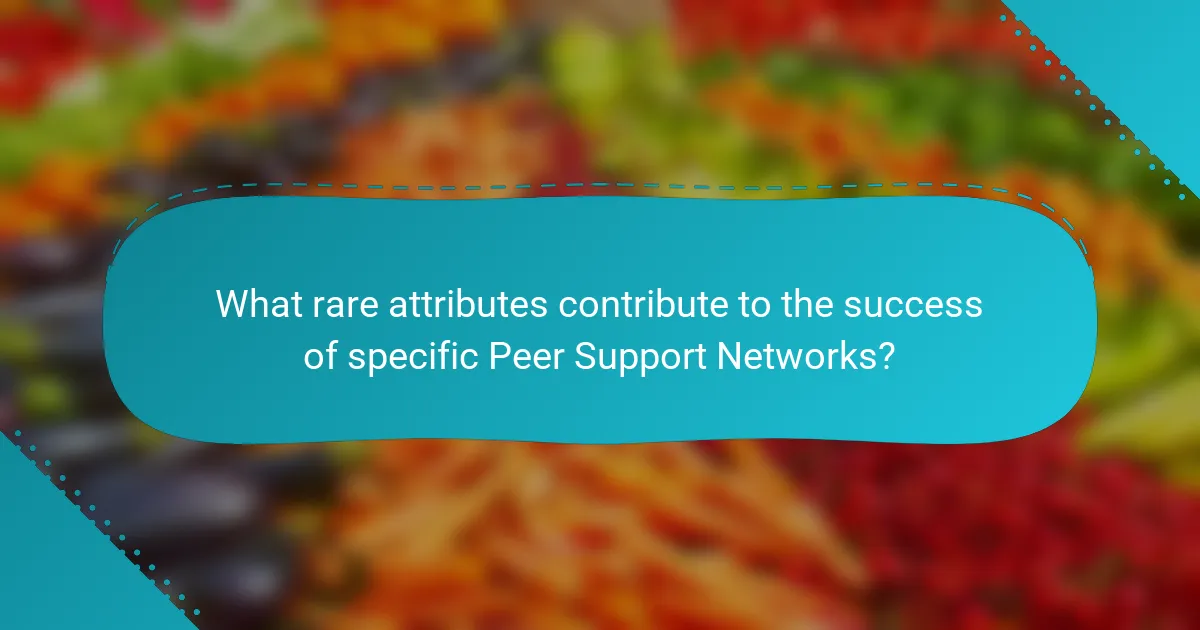
What rare attributes contribute to the success of specific Peer Support Networks?
Rare attributes that contribute to the success of specific Peer Support Networks for women include unique leadership styles, culturally tailored resources, and innovative outreach methods. These elements foster inclusivity and enhance engagement. For instance, networks that prioritise intersectionality often address diverse needs effectively. Additionally, the presence of trained facilitators with lived experience can create a safe space for sharing. Such rare attributes differentiate successful networks from others, ensuring they meet specific community needs.
What innovative approaches have emerged in women-focused networks?
Innovative approaches in women-focused networks emphasise collaboration and inclusivity. These networks leverage technology to create virtual support systems, enhancing accessibility for women across diverse backgrounds. Initiatives like mentorship programmes and skill-sharing workshops foster empowerment and professional growth. Additionally, intersectional strategies address unique challenges faced by women of different identities, promoting a more holistic support environment.
How do certain networks adapt to unique challenges faced by women?
Peer support networks for women adapt to unique challenges by fostering community, providing emotional support, and sharing resources. These networks enhance resilience and empowerment, addressing issues like workplace discrimination and mental health. By creating safe spaces, women can connect, share experiences, and strategise solutions collectively. Accessibility is improved through online platforms, enabling wider participation and support for diverse backgrounds.
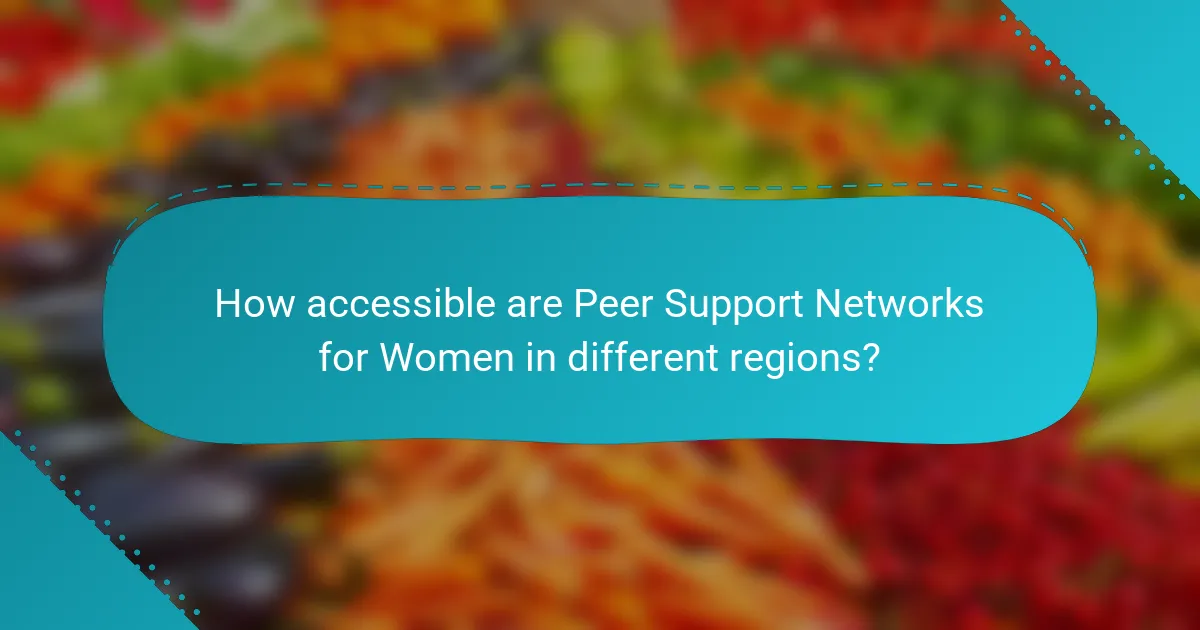
How accessible are Peer Support Networks for Women in different regions?
Peer support networks for women vary significantly in accessibility across different regions. In urban areas, these networks often have more resources and outreach programmes, making them easier to access. Conversely, rural regions may lack sufficient support structures, limiting availability. Accessibility is influenced by factors such as cultural attitudes, funding, and local initiatives. For instance, regions with strong community engagement typically see higher participation rates. In contrast, areas with stigma around mental health may struggle to establish effective networks.
What barriers do women face in accessing these networks?
Women face several barriers in accessing peer support networks, including lack of awareness, social stigma, and limited resources. Many women are unaware of the existence of these networks, which diminishes their ability to seek support. Social stigma can discourage women from participating, as they may fear judgment or misunderstanding from others. Additionally, limited resources such as time, transportation, and financial constraints can hinder access. These barriers can be particularly pronounced for marginalised groups, making it essential to address them to enhance network accessibility.
How do online platforms enhance accessibility?
Online platforms significantly enhance accessibility for peer support networks for women by providing flexible communication channels. These platforms enable women to connect regardless of geographical barriers, fostering a sense of community. For instance, virtual meetings and forums allow participation at any time, accommodating various schedules.
Additionally, online resources can be tailored to meet diverse needs, offering information on mental health, career advice, and personal experiences. This customisation ensures that unique attributes of individual users are addressed, enhancing engagement and support.
Moreover, anonymity in online settings can encourage more women to seek help, reducing stigma associated with discussing personal issues. As a result, these platforms empower women to share experiences and build resilience collectively.
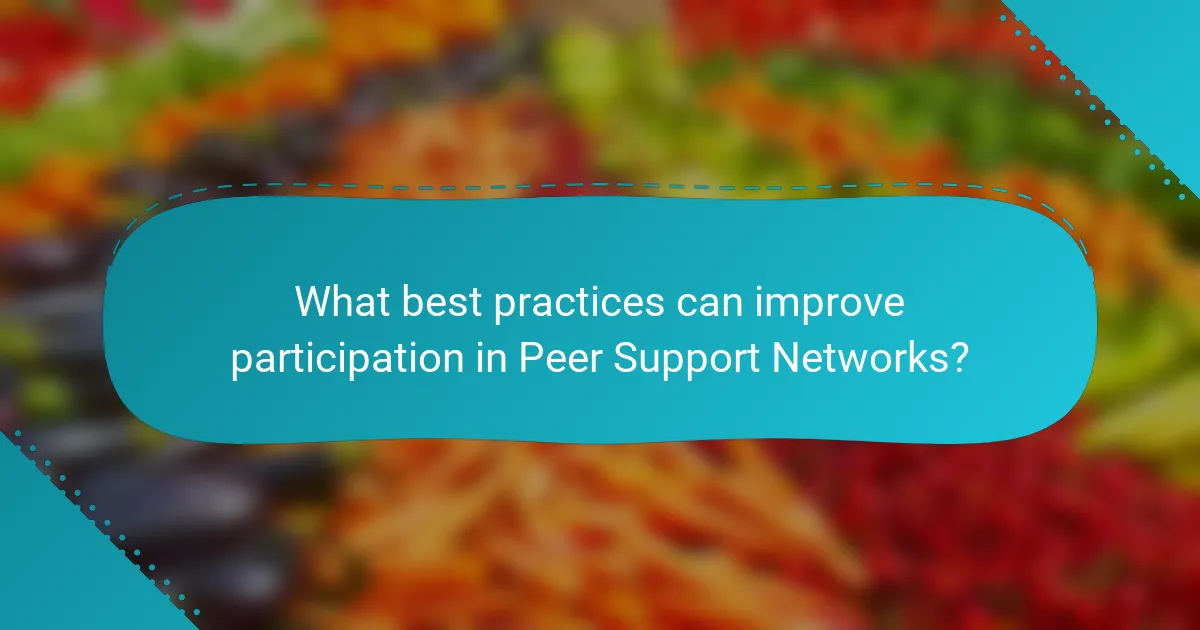
What best practices can improve participation in Peer Support Networks?
Encouraging participation in Peer Support Networks for women can be achieved through targeted strategies. Creating a welcoming environment fosters trust and openness, essential for effective communication. Regularly scheduled meetings enhance accessibility, making it easier for members to engage consistently.
Incorporating diverse activities, such as workshops and discussions, caters to various interests, boosting participation. Utilising technology, like online platforms, can expand reach and accommodate those unable to attend in person.
Lastly, promoting success stories within the network showcases the positive impact and motivates others to join. These practices collectively enhance the effectiveness and accessibility of Peer Support Networks for women.
What strategies can be implemented to increase engagement?
To increase engagement in peer support networks for women, implement strategies that foster connection and accessibility. Encourage regular meetings that focus on shared experiences, providing a platform for open dialogue. Utilise social media to create online communities, allowing members to interact beyond physical gatherings. Offer resources and training to enhance communication skills, making participants feel more confident in sharing. Lastly, gather feedback to continually adapt and improve the network’s offerings, ensuring they meet the evolving needs of members.
What common mistakes should be avoided when joining or forming a network?
Joining or forming a peer support network for women requires careful consideration to avoid common mistakes. First, ensure clear communication of goals and expectations among members. Second, avoid excluding diverse voices, as inclusivity enhances the network’s impact. Third, do not neglect the importance of regular engagement; consistent participation fosters stronger connections. Lastly, be cautious of unclear leadership roles, as defined responsibilities help maintain structure and accountability within the network.
How can women leverage these networks for personal growth?
Women can leverage peer support networks for personal growth by accessing resources, sharing experiences, and building confidence. These networks provide emotional support and mentorship opportunities, fostering a sense of community. Engaging with diverse perspectives enhances problem-solving skills and personal development. Additionally, participating in these networks can lead to career advancement through networking and collaboration.
